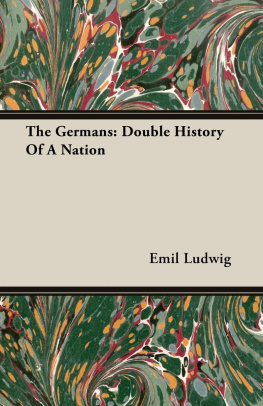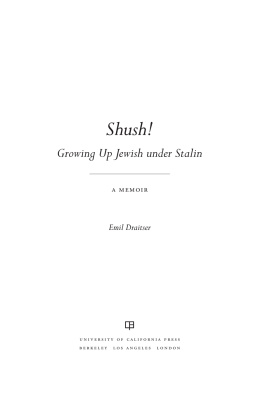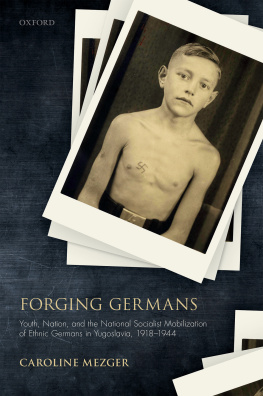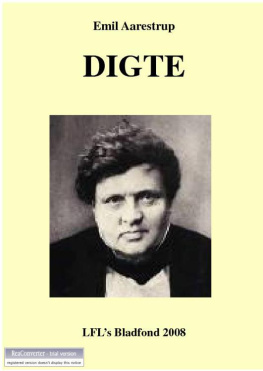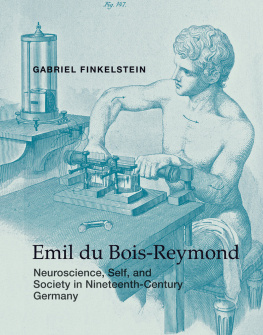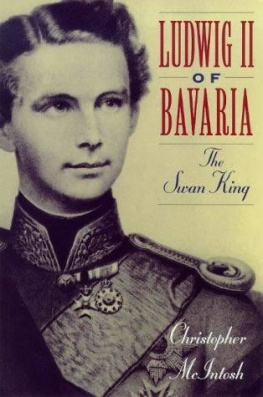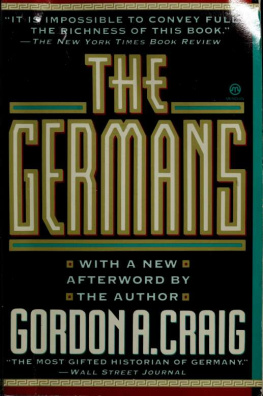Foreword
T HIS BOOK offers a history, not of Germany, but of the Germans. Here as in all his writings, the authors scope is psychological. Even so, a complete story cannot be encompassed within the range of a single volumehere too the artists skill lies in his selection. There are indifferent German emperors, whose names will not be found in the pages that follow; for the purpose is not to tire the readers mind with as many names as possible, but to stimulate it with a smaller number of fully rounded characters. Battles and other external events resemble the zenith of a trajectory, whereas the real points of interest are where the projectile is fired and where it strikescause and effect. On every one of the four hundred ninety-five pages that follow, it is the authors purpose to explain causes and effects of deeds and eventsexplain them through the German character. The German way of feeling, the cruel schism within the German soul which has remained unchanged throughout the agesthese are here to be developed, through two thousand years.
There is no objective writing of history outside the encyclopedia. The present version, too, is conditioned by personal factors. Only the admission of this fact distinguishes it from others. In all lands certain professors strike rigid poses like the Supreme Judge on a Byzantine mosaic, and they often deceive their readers and themselves about the extent to which their own subjective destinies, fortunes and reverses influence their writings. An author who conceals his own situation and that of the age in which he lives leads the reader astray and grows tedious in the bargain. This is true especially in times such as our own when violent partisanship sets men against each other. No historian, not even the great Plutarch, would have written exactly as he did, had he written a century earlier or later. Carlyle was deeply influenced by the French Revolution, Burckhardt by the age of Bismarck; both were similarly influenced by deep-felt personal experiences, even when they wrote of distant times. The way in which one epoch mirrors itself in another is precisely what lends wings to author and reader.
Since my twentieth year I have depicted the German character in a dozen dramas and biographies, from Ulrich von Hutten and Grnewald to Goethe, Beethoven, Weber and Wagner; and from Emperor Frederic II and King Frederic the Great to Bismarck, William and Hindenburgalways with reverence for the German spirit, but with censure for the German State. This discrepancy between State and spirit distinguishes German history from that of all other nations. It always obscures the spirit precisely when the State flourishes and vice versa. That is the subject of this new book, which seeks to go beyond the destiny of individual Germans to explain the character of the nation. It is a tragic and ironic spectacle, repeated throughout the centuries from Arminius to Hitler. It offers an answer to the question which all the world poses today: How is it possible for the people of Goethe, Beethoven and Kant to be relapsing forever into barbarism? German culture was hardly ever represented by the governing classes; it was created by the governed.
The reasons why, in this dual history, one part of the people remained almost without influence on the other, lie in the complex and nervous character of the Germans, whose development we shall here outline, from the primeval forests of Caesar to the forest of Compigne. This history, in which intellectual and political life pursue separate courses, resembles a two-story omnibus. The passengers on the upper level enjoy a broader view but remain without influence on the direction of the vehicle, because the driver below fails to take notice of them.
Apart from this peculiarity, it will be shown how the forms of power which have made the name of Germany so hated and feared throughout the world come from the North (later Prussia), while the forms of the spirit and of art which constitute the everlasting glory of Germany come from the South and the West. It will be shown, furthermore, why the treasures that German culture has given to the world derive wholly from commoners, while the princes and nobles have brought forth only violence. The few exceptions to this rule, so deeply rooted in the German character, are the subject of special emphasis.
Yet all the German emperors and chancellors taken together do not mean as much to the outside world as Mozart and Schubert, as Drer and Cologne Cathedral. No German victory has impressed itself so deeply upon mankind as the invention of the art of printing. It seemed more important to the author to give a picture of the mental state of this warrior people than to describe its battles. The causes and consequences of its passion for war seemed to him more significant than the wars themselves.
And finally it will be shown that Hitler is not an adventurer cast up in Germany by the merest chance, but a truly German phenomenon; and that all well-intentioned efforts to make a distinction between him and the German character miss their point. His spirit enters upon the stage in the very first scene of this book, and if he himself is allotted but two out of eighty-two chapters, it is only today that this seems scant; a German history of the year 2000 is likely to concede him even less. Since this book is to be published in languages other than German, the chapters dealing with the Middle Ages have been severely cut. The author has tried a new method towards which he has been moving for some time. You will find celebrated historical facts simply recorded in this book, whilst inner evolutions are elaborately developed. Parliamentary resolutions, battles and redistribution of territory are of little importance to posterity as succeeding wars and events again change the newly established order.
Three things, however, are of great importance: the spiritual reasons and results of events; the character of the persons who bring them about; and comparisons with our present time. History is not made principally by economic forces but by the emotions of men. And, as these always remain the same, every epoch will be reflected in the persons emerging from the background of this historical picture.
Born a German, the author owes his education to a civilization represented by the genius of Beethoven and Goethe. But the German State was alien to him even in his youth, so he left it at the age of twenty-five and went to live in free Switzerland, of which he has been a citizen for many years. This book was written in California, in one of the loveliest places in the world, whilst the author lived in an atmosphere of German music and philosophy.



